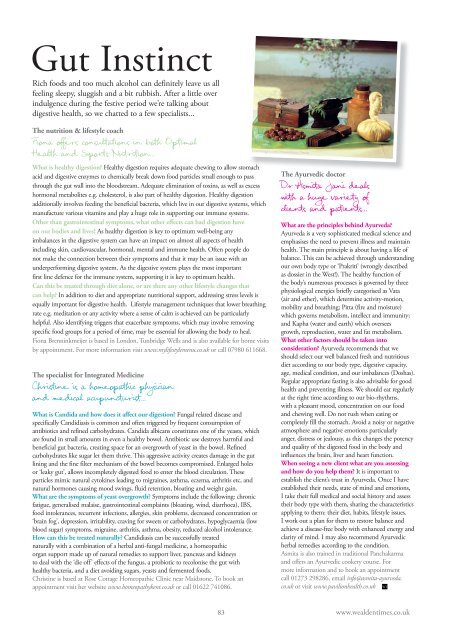Surrey Homes | SH15 | January 2016 | Health & Beauty supplement inside
The lifestyle magazine for Surrey - Inspiring Interiors, Fabulous Fashion, Delicious Dishes
The lifestyle magazine for Surrey - Inspiring Interiors, Fabulous Fashion, Delicious Dishes
You also want an ePaper? Increase the reach of your titles
YUMPU automatically turns print PDFs into web optimized ePapers that Google loves.
Gut Instinct<br />
Rich foods and too much alcohol can definitely leave us all<br />
feeling sleepy, sluggish and a bit rubbish. After a little over<br />
indulgence during the festive period we’re talking about<br />
digestive health, so we chatted to a few specialists...<br />
The nutrition & lifestyle coach<br />
Fiona offers consultations in both Optimal<br />
<strong>Health</strong> and Sports Nutrition...<br />
Freeimages.com/Musaddique Naina<br />
What is healthy digestion? <strong>Health</strong>y digestion requires adequate chewing to allow stomach<br />
acid and digestive enzymes to chemically break down food particles small enough to pass<br />
through the gut wall into the bloodstream. Adequate elimination of toxins, as well as excess<br />
hormonal metabolites e.g. cholesterol, is also part of healthy digestion. <strong>Health</strong>y digestion<br />
additionally involves feeding the beneficial bacteria, which live in our digestive systems, which<br />
manufacture various vitamins and play a huge role in supporting our immune systems.<br />
Other than gastrointestinal symptoms, what other effects can bad digestion have<br />
on our bodies and lives? As healthy digestion is key to optimum well-being any<br />
imbalances in the digestive system can have an impact on almost all aspects of health<br />
including skin, cardiovascular, hormonal, mental and immune health. Often people do<br />
not make the connection between their symptoms and that it may be an issue with an<br />
underperforming digestive system. As the digestive system plays the most important<br />
first line defence for the immune system, supporting it is key to optimum health.<br />
Can this be treated through diet alone, or are there any other lifestyle changes that<br />
can help? In addition to diet and appropriate nutritional support, addressing stress levels is<br />
equally important for digestive health. Lifestyle management techniques that lower breathing<br />
rate e.g. meditation or any activity where a sense of calm is achieved can be particularly<br />
helpful. Also identifying triggers that exacerbate symptoms, which may involve removing<br />
specific food groups for a period of time, may be essential for allowing the body to heal.<br />
Fiona Brenninkmeijer is based in London, Tunbridge Wells and is also available for home visits<br />
by appointment. For more information visit www.mylifestylemenu.co.uk or call 07980 611668.<br />
The specialist for Integrated Medicine<br />
Christine is a homeopathic physician<br />
and medical acupuncturist...<br />
What is Candida and how does it affect our digestion? Fungal related disease and<br />
specifically Candidiasis is common and often triggered by frequent consumption of<br />
antibiotics and refined carbohydrates. Candida albicans constitutes one of the yeasts, which<br />
are found in small amounts in even a healthy bowel. Antibiotic use destroys harmful and<br />
beneficial gut bacteria, creating space for an overgrowth of yeast in the bowel. Refined<br />
carbohydrates like sugar let them thrive. This aggressive activity creates damage in the gut<br />
lining and the fine filter mechanism of the bowel becomes compromised. Enlarged holes<br />
or ‘leaky gut’, allows incompletely digested food to enter the blood circulation. These<br />
particles mimic natural cytokines leading to migraines, asthma, eczema, arthritis etc, and<br />
natural hormones causing mood swings, fluid retention, bloating and weight gain.<br />
What are the symptoms of yeast overgrowth? Symptoms include the following: chronic<br />
fatigue, generalised malaise, gastrointestinal complaints (bloating, wind, diarrhoea), IBS,<br />
food intolerances, recurrent infections, allergies, skin problems, decreased concentration or<br />
‘brain fog’, depression, irritability, craving for sweets or carbohydrates, hypoglycaemia (low<br />
blood sugar) symptoms, migraine, arthritis, asthma, obesity, reduced alcohol intolerance.<br />
How can this be treated naturally? Candidiasis can be successfully treated<br />
naturally with a combination of a herbal anti-fungal medicine, a homeopathic<br />
organ support made up of natural remedies to support liver, pancreas and kidneys<br />
to deal with the ‘die off’ effects of the fungus, a probiotic to recolonise the gut with<br />
healthy bacteria, and a diet avoiding sugars, yeasts and fermented foods.<br />
Christine is based at Rose Cottage Homeopathic Clinic near Maidstone. To book an<br />
appointment visit her website www.homeopathykent.co.uk or call 01622 741086.<br />
The Ayurvedic doctor<br />
Dr Asmita Jani deals<br />
with a huge variety of<br />
clients and patients...<br />
What are the principles behind Ayurveda?<br />
Ayurveda is a very sophisticated medical science and<br />
emphasises the need to prevent illness and maintain<br />
health. The main principle is about having a life of<br />
balance. This can be achieved through understanding<br />
our own body type or ‘Prakriti’ (wrongly described<br />
as dossier in the West!). The healthy function of<br />
the body’s numerous processes is governed by three<br />
physiological energies briefly categorised as Vata<br />
(air and ether), which determine activity-motion,<br />
mobility and breathing; Pitta (fire and moisture)<br />
which governs metabolism, intellect and immunity;<br />
and Kapha (water and earth) which oversees<br />
growth, reproduction, water and fat metabolism.<br />
What other factors should be taken into<br />
consideration? Ayurveda recommends that we<br />
should select our well balanced fresh and nutritious<br />
diet according to our body type, digestive capacity,<br />
age, medical condition, and our imbalances (Doshas).<br />
Regular appropriate fasting is also advisable for good<br />
health and preventing illness. We should eat regularly<br />
at the right time according to our bio-rhythms,<br />
with a pleasant mood, concentration on our food<br />
and chewing well. Do not rush when eating or<br />
completely fill the stomach. Avoid a noisy or negative<br />
atmosphere and negative emotions particularly<br />
anger, distress or jealousy, as this changes the potency<br />
and quality of the digested food in the body and<br />
influences the brain, liver and heart function.<br />
When seeing a new client what are you assessing<br />
and how do you help them? It is important to<br />
establish the client’s trust in Ayurveda. Once I have<br />
established their needs, state of mind and emotions,<br />
I take their full medical and social history and assess<br />
their body type with them, sharing the characteristics<br />
applying to them: their diet, habits, lifestyle issues.<br />
I work out a plan for them to restore balance and<br />
achieve a disease-free body with enhanced energy and<br />
clarity of mind. I may also recommend Ayurvedic<br />
herbal remedies according to the condition.<br />
Asmita is also trained in traditional Panchakarma<br />
and offers an Ayurvedic cookery course. For<br />
more information and to book an appointment<br />
call 01273 298286, email info@asmita-ayurveda.<br />
co.uk or visit www.pavilionhealth.co.uk<br />
83 www.wealdentimes.co.uk


















